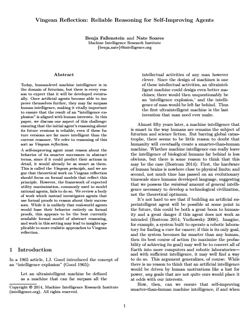 Today we release a new technical report by Benja Fallenstein and Nate Soares, “Vingean Reflection: Reliable Reasoning for Self-Improving Agents.” If you’d like to discuss the paper, please do so here.
Today we release a new technical report by Benja Fallenstein and Nate Soares, “Vingean Reflection: Reliable Reasoning for Self-Improving Agents.” If you’d like to discuss the paper, please do so here.
Abstract:
Today, human-level machine intelligence is in the domain of futurism, but there is every reason to expect that it will be developed eventually. Once artificial agents become able to improve themselves further, they may far surpass human intelligence, making it vitally important to ensure that the result of an “intelligence explosion” is aligned with human interests. In this paper, we discuss one aspect of this challenge: ensuring that the initial agent’s reasoning about its future versions is reliable, even if these future versions are far more intelligent than the current reasoner. We refer to reasoning of this sort as Vingean reflection.
A self-improving agent must reason about the behavior of its smarter successors in abstract terms, since if it could predict their actions in detail, it would already be as smart as them. This is called the Vingean principle, and we argue that theoretical work on Vingean reflection should focus on formal models that reflect this principle. However, the framework of expected utility maximization, commonly used to model rational agents, fails to do so. We review a body of work which instead investigates agents that use formal proofs to reason about their successors. While it is unlikely that real-world agents would base their behavior entirely on formal proofs, this appears to be the best currently available formal model of abstract reasoning, and work in this setting may lead to insights applicable to more realistic approaches to Vingean reflection.
This is the 4th of six new major reports which describe and motivate MIRI’s current research agenda at a high level.